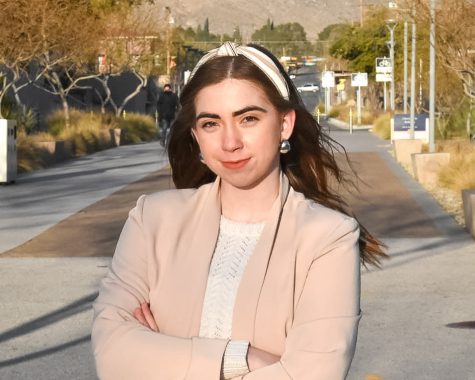Benjamin Reyes, 36, began working as a substitute teacher for the El Paso Independent School District in December of 2018. What sets Reyes apart from most teachers is the way that Reyes identifies in regard to gender.
Reyes identifies as nonbinary, meaning they do not align with a particular gender and have adopted the pronouns they and them as descriptors of identity, as opposed to he and him or she and her.
Reyes can often be seen sporting a beard and donning long skirts and dresses with lipstick every now and then as a finishing touch. In the classroom, students use mister or miss interchangeably to address Reyes.
After graduating from UTEP in 2007 with a bachelor’s degree in multidisciplinary studies, Reyes went on to teach at a charter high school in west El Paso for the next three years. It was during that time that Reyes experienced issues surrounding gender with parents and the school administration.
When Reyes was initially hired, they had chosen to identify as a male with the school’s administration. Eventually, it was Reyes’ students who outed them as genderqueer.
It did not take long before conflict ensued.
At first, the school administration stated their support for Reyes and ensured that being genderqueer was not an issue. However, students’ parents were much less supportive and their complaints soon started accumulating.
The school eventually let go of Reyes, removing them from their teaching position. The grounds for termination are unclear. Furthermore, the school did not comment on the situation and could not confirm whether Reyes was employed there.
“The way I looked at it is they had an issue with having someone who was queer–identified within the classroom,” Reyes said. “At that point, I realized that I cannot be anyone but myself. So, if I was going to pursue a career or any other kind of job or profession, I would need to make sure that I can be me within the confines of the rules and regulations of the company.”
For the next eight years, Reyes took on a number of different jobs, eventually returning to work in education.
The first thing Reyes did before applying to substitute job openings was read the employer’s handbook. More specifically, Reyes examined the EPISD dress code for any regulations that would distinguish the attire allowed for women versus the one allowed for men. There were no such rules in place.
“It wasn’t a case of ‘Men have to wear this and women have to wear that,’” Reyes explained. “It was more, ‘Employees must adhere to this.’”
This made Reyes comfortable enough to express themselves through the clothing they wear, be it masculine, feminine or androgynous.
Compared to a decade ago, the environment surrounding Reyes is generally more accepting. Still, Reyes’ appearance continues to be questioned.
“Every once in a while, you might have kids who will say, ‘Well, what you’re wearing is supposed to be for girls,’“ Reyes said. “In that case, my response would be as simple as, ‘This is what I wear. These are not girl clothes or boy clothes. These are my clothes. I bought them and I like wearing them.’”
While legislation has been passed to prevent the discrimination of some marginalized groups, there are no laws in Texas prohibiting public schools from discriminating against potential and current employees based on their sexual orientation or gender identity and expression.
“This is what the Supreme Court is trying to decide right now,” explained Charlotte Ullman, a UTEP associate professor in teacher education and a member of the LGBTQ community.
The proposed Employment Non-Discrimination Act (ENDA) would prohibit discrimination in hiring and employment on the basis of sexual orientation or gender identity by employers with at least 15 employees.
However, even if the ENDA is passed, there will continue to be challenges that stand in the way of reaching a comprehensive equality, not just for transgender and other LGBTQ individuals, but for every minority group.
“It would be great if that instantly meant that all discrimination goes away; it doesn’t,” Ullman said. “I think the more we can educate students about LGBTQ history, Chicano history and things that have been erased from the curriculum, the more we will be able to produce new generations of folks who are more understanding.”
Margaret Cataldi may be reached at [email protected]











